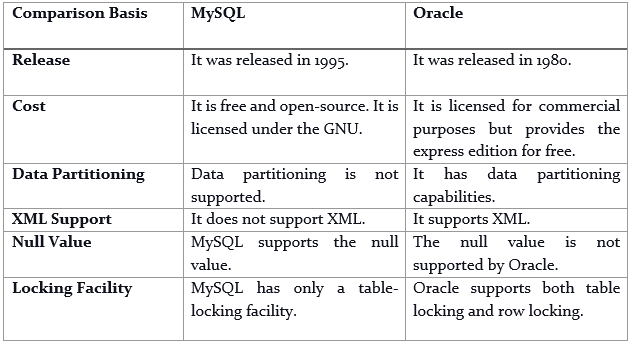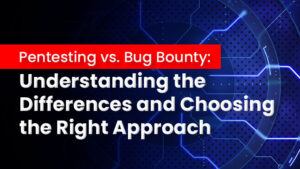Introduction
MySQL and Oracle are two well-known relational databases that are utilized in both small and large businesses. Although Oracle Corporation supports both databases, there are significant distinctions between them. Compared to MySQL, Oracle is the more robust software. This section will compare the differences between MySQL and Oracle database systems based on various characteristics.
Check out our courses now if you want to start your career in Cloud Computing.
What is MySQL?
One of the most well-known technologies in the current big data ecosystem is MySQL. Given that MySQL is sometimes referred to as the most popular database and is currently being used widely and successfully across all industries.
Features of the MySQL
The following are the characteristics of the MySQL database:
- MySQL is a simple relational database management system. We can create and interact with MySQL with simple SQL lines.
- MySQL is secure because passwords are encrypted.
- It is built on a client/server model.
- It is open-source and free.
- It is expandable.
- It supports transaction rollback, commit, and crash recovery.
- It offers excellent performance, flexibility, and productivity.
Advantages of MySQL
MySQL is a better alternative in a few situations. This is an example of when the database can be scaled to a manageable extent. Another example is when a read-only database is required for a website or online application. If a higher replication level is not required, MySQL is the preferable option. The budget is also a solid reason to adopt MySQL because it has a free and open version under a GNU license. The final argument for preferring MySQL over Oracle is when concurrency is low or simple queries are required.
Disadvantages of MySQL
Since Oracle owns MySQL, it has significant limitations compared to competing for open-source relational database management systems. Although it is suitable for small and large enterprises, it is designed for small amounts of data. It is also possible to employ triggers. Although these can be pretty valuable for data, they can also burden the database server.
It also cannot support big thread pools, although this is because of its lower memory storage capacity compared to Oracle.
What is Oracle?
Oracle is a relational database system that minimizes error-prone human database management by providing self-driving, self-securing, and self-repairing capabilities. Oracle is a multi-platform database system that can run on various operating systems. It enables fast and secure data storage and retrieval. It is the first database program designed for corporate use that uses a query language to manage data.
Features of Oracle Database
An Oracle database must have the following components:
- Oracle database is cross-platform in that it can run on various operating systems, including Windows, Linux, and Mac.
- It offers a conceptual database structure, which lets you interact with the database without knowing where your data is physically stored.
- It is programmable, scalable, portable, distributed, and portable.
- It is capable of handling massive amounts of data quickly.
- Oracle features networking stacks that allow users to interact with apps across platforms with the Oracle database smoothly.
- It includes a recovery manager tool for cold, hot, and incremental database backups and recoveries.
Advantages of Oracle Database
Portability
Oracle’s database is more widely available on various platforms than its competitors. It efficiently runs on nearly 20 networking protocols and over 100 hardware platforms.
Backup and Recovery
It is useful for taking a proper backup of the entire Oracle online backup and recovery. One can efficiently perform a point-in-time recovery with the help of an Oracle database. The same thing makes it easy to write an Oracle application by making safe changes to the operating system and hardware. You will need storage space as well as archive mechanisms for this.
High Performance
Creating a good Oracle database provides you with relatively good speed and large databases. Furthermore, with transaction control and locking, the Oracle database improves performance and speed of consideration.
Multiple Database Support
The best benefit of using the Oracle database is that it efficiently manages multiple databases within the same transaction.
Versions Changes
Oracle keeps you updated on the next major release and any potential changes so you can be ready. It provides good backward compatibility, so you will not have to rewrite an application when upgrading the DBMS.
Disadvantages
The benefits of Oracle databases outweigh the drawbacks, but you should be aware of their limitations.
- For the local on-premises version of Oracle, extensive SQL knowledge and administrative experience in database management are required.
- Oracle licenses are costly.
- The hardware requirements for the local on-premises version are quite high.

Open-Source Database
MySQL is an open-source database. However, Oracle SQL is designed to be a commercial product. This means that you would be unable to utilize Oracle SQL without a license. There is a free express edition of Oracle SQL, but it is solely suggested for usage by students.
Database Capabilities
Both small and large organizations can use MySQL because of its scalability. Oracle SQL is built for scale and can handle big data sets.
MySQL only functions with static systems and does not support data splitting. Data partitioning is supported by Oracle SQL, nevertheless. Additionally, it is applicable to both static and dynamic systems. Oracle SQL does not, however, handle all kinds, only a subset of them. For example, MySQL allows for Null values. Null values are not supported by Oracle SQL.
Security and Administration
Both Oracle SQL and MySQL contain security features like usernames and passwords. There are a few minor variations between the two, though. A host must be recognized, for instance, in MySQL. However, users can access the database if they have the host, a username, and a password. A profile must be validated in addition to a login and password when using Oracle SQL. This implies that if the profile is not configured, the user cannot access it. That also aids in the user role definition.
Conclusion
This article thoroughly examined the two most popular database technologies on the market today: MySQL and Oracle. It discusses both databases as well as their features and limitations. It also provided the criteria for judging each of the Databases. Overall, the choice of which Database is best for the company is determined by the company’s goals and resources.








